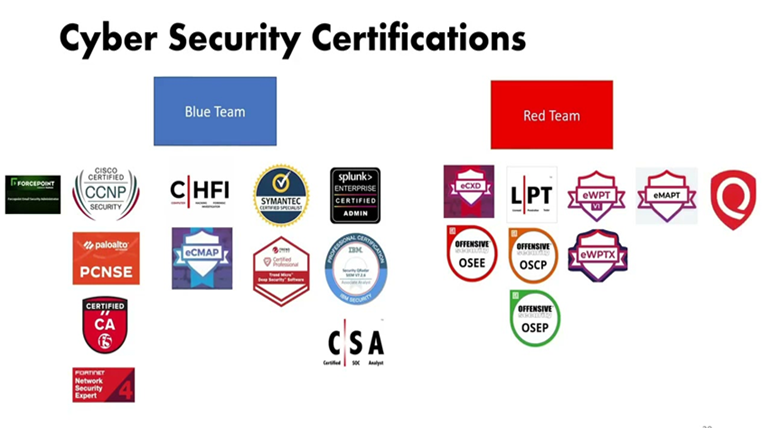A Beginner's Guide to Cybersecurity Certifications

1 year ago
A Beginner's Guide to Cybersecurity Certifications
As the digital world expands, the demand for skilled cybersecurity professionals has skyrocketed.
If you are new to cybersecurity and looking to break into the field, certifications can be a valuable way to validate your skills, demonstrate your knowledge, and increase your job prospects. But with so many options available, a beginner might be confused about where to start.
This guide will walk you through the basics of cybersecurity certifications, their importance, and which ones are ideal for beginners.
The Importance Of Cybersecurity Certifications
Certifications serve as a bridge between learning and practical application in the cybersecurity field. Here is why they matter:
- Industry Recognition: Certifications are globally recognized and respected by employers, offering a benchmark for your skills.
- Skill Validation: They demonstrate your expertise in specific cybersecurity areas, such as network security, risk management, or ethical hacking.
- Career Advancement: Certifications often lead to better job opportunities, higher salaries, and career growth.
- Continuous Learning: Many certifications require regular renewals, keeping you updated on the latest cybersecurity trends and practices.
Key Cybersecurity Certifications for Beginners
If you are just starting your cybersecurity journey, these certifications are a great place to begin:
1. CompTIA Security+
- Overview: A widely recognized entry-level certification that covers the basics of cybersecurity, including threats, vulnerabilities, and risk management.
- Why It’s Great for Beginners: No prior experience is required, and it provides a strong foundation for more advanced certifications.
- What You’ll Learn:
- Network security
- Cryptography basics
- Identity management
- Threat detection and response
2. Certified Information Systems Security Professional Associate (CISSP Associate)
- Overview: Designed for beginners interested in pursuing the CISSP credential in the future, this certification is for those who may not yet meet the experience requirements for full certification.
- Why It’s Great for Beginners: It introduces you to key cybersecurity concepts and allows you to build toward the highly respected CISSP.
- What You’ll Learn:
- Security operations
- Risk management
- Security architecture and engineering
3. CompTIA Cybersecurity Analyst (CySA+)
- Overview: Focuses on proactive threat detection and response using data analysis and behavioral analytics.
- Why It’s Great for Beginners: Ideal for those with some IT or Security+ knowledge who want to move into an analyst role.
- What You’ll Learn:
- Threat management
- Security operations
- Vulnerability management
4. Certified Ethical Hacker (CEH) – Practical
- Overview: Focuses on ethical hacking techniques to identify and fix vulnerabilities in networks and systems.
- Why It’s Great for Beginners: Suitable for those curious about penetration testing and offensive security.
- What You’ll Learn:
- Hacking methodologies
- Reconnaissance and Scanning
- Exploiting vulnerabilities
5. Microsoft Certified: Security, Compliance, and Identity Fundamentals
- Overview: A beginner-friendly certification focused on Microsoft’s security solutions.
- Why It’s Great for Beginners: Ideal for those interested in cloud security and Microsoft ecosystems.
- What You’ll Learn:
- Security concepts in cloud environments
- Identity protection
- Access management
6. GIAC Security Essentials Certification (GSEC)
- Overview: A certification that covers general security concepts and practical applications.
- Why It’s Great for Beginners: Great for IT professionals transitioning to cybersecurity.
- What You’ll Learn:
- Network security essentials
- Incident response
- Cryptography
Steps to Get Started with Cybersecurity Certifications
- Assess Your Interests: Determine whether you’re more interested in defensive security, offensive security, or general cybersecurity concepts.
- Build a Foundation: Gain basic knowledge in IT and networking through resources like online courses, tutorials, or books.
- Choose the Right Certification: Start with a beginner-friendly certification, such as CompTIA Security+ or Microsoft Fundamentals, to establish your credentials.
- Study Strategically: Use a combination of study guides, video tutorials, and practice exams. Many certification providers offer official study resources.
- Gain Hands-On Experience: Use free tools, labs, and platforms like TryHackMe or Hack The Box to practice real-world scenarios.
Join Communities: Participate in cybersecurity forums, LinkedIn groups, or Discord channels to connect with peers and learn from their experiences.
Tips for Success
- Set a Schedule: Dedicate consistent time for studying and practicing.
- Practice Exam Questions: Familiarize yourself with the question format and timing of the certification exam.
- Don’t Skip Basics: Understanding networking and operating systems will make advanced topics easier.
- Keep Learning: Once you’ve earned one certification, continue exploring others to deepen your expertise.
Conclusion
Cybersecurity certifications are a powerful way to kickstart your career in the field. They not only enhance your resume but also equip you with the knowledge and confidence to tackle real-world security challenges.
By starting with beginner friendly certifications and gradually advancing to specialized ones, you can build a strong foundation and grow into a skilled cybersecurity professional. Whether you aim to become a security analyst, ethical hacker, or compliance officer, the journey begins with the first step—choose a certification and start learning today!
©everlastcyber





1 Comment
Gerome
Thank you EverlastCyber for this insightful post. I am your YouTube subscriber, and have learnt quite a lot from your contents. Keep it up!!